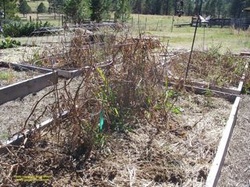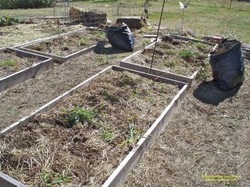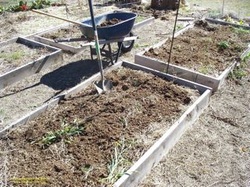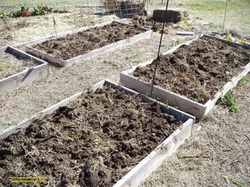Fall is a great time to work in the garden. Daytime temperatures can be warm enough to work comfortably without the heat stress of summer and the soil is warm enough to handle digging and amending. You've had the entire growing season to identify things you want to do and change in your garden and those thoughts are still fresh in your mind while all of your tools and supplies are still in place. Take advantage of that and get outside before the cold of winter keeps you cooped up in the house.
After the first frost kills your warm season plants and subsequent freezes finish off the others, the withered vegetation can become a blight in your landscape. Gone are the vibrant colors and verdant backgrounds. Solely from an aesthetic perspective, removing the plant carcasses makes an immediate positive impact.
Most of the dead plants should find their way to your compost pile; chopping or cutting them into smaller pieces will hasten decomposition. Tomatoes and potatoes are best carted off in the trash, especially if you had any problem with fungal or bacterial infections. If you compost tomato plants with a disease you will introduce that same problem to future plantings when you spread the compost.
Cool season plants will continue to grow in cold weather and don't need to be removed right away. Leaving brassica plants like cabbage, kale, broccoli, Brussels sprouts, cauliflower, and radishes is a natural way to kill some insect pests. The vegetation attracts some harmful insects. After harsh winter temperatures finally kill them and the plants begin to decompose in early spring, they'll actually release cyanide compounds that will kill those pests. You can pull them up and add them to the compost pile in spring.
If you don't have a compost pile, the debris of fall creates a great start. Stack the dead plants in your designated area and you now have a compost pile. Add the leaves that are piling up on your lawn and kitchen scraps you used to throw away. You probably won't have the perfect blend of material to allow decomposition during the cold temperatures of winter, but you'll have a mass that will begin to turn into compost with the warmth and rain of spring.
With your beds cleaned up, it's easy to see the perennial weeds that have been lurking under cover. Left unchecked those weeds will grow, set seed, and multiply before you return for spring planting. The soil is still workable so deal with those invaders now. Dig them up and throw them on your compost pile. The green of the weeds is a nice balance to the brown of the dead plants.
I add to my compost pile throughout the year and at the end of the growing season I usually have a batch of compost ready to use. With the beds cleaned up I add a layer of that compost to the surface. Along with the straw and grass I used as mulch, it is a great organic amendment to the soil. Aged manure works well too. This year I also added the bedding and droppings from my neighbor's rabbits that have been aging in a pile all summer. Store-bought compost and soil amendments are a good alternative.
In a few hours my vegetable garden is ready for spring planting. Sure the task is completed months ahead of time, but when the air and soil temperatures are finally warm enough in early spring I want to get to planting. Cleaning up the withered plants in spring is an unnecessary delay.
There are many activities to keep me busy now and in the months ahead, but an entire garden, the vegetable garden, is put to bed for winter. It required effort, though it wasn't hard. In a small way I can relax a little as I focus on other things. And it's a nice feeling to look back on the season from first seed to last plant on the compost pile and think about all the enjoyment it provided.




 RSS Feed
RSS Feed